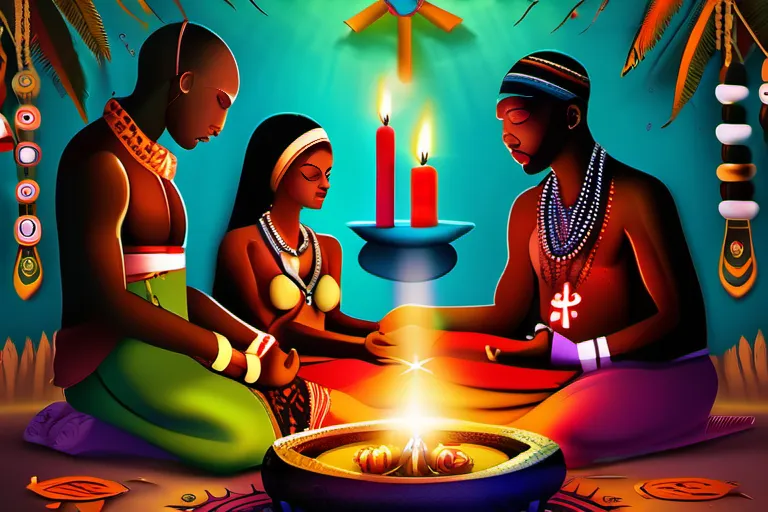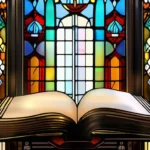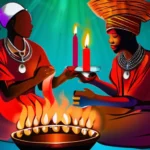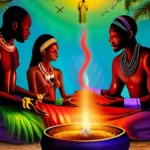Exploring the beliefs, practices, and history of Vodou in Haiti and beyond
Vodou is a complex and fascinating religion that originated in Africa and has been practiced for centuries in Haiti. This article will provide an overview of the key aspects of Vodou, including its origins, beliefs, practices, and role in Haitian culture.
The Origins of Vodou
The origins of Vodou are like uncovering a hidden treasure map, leading us through the tumultuous history that connects Africa and Haiti. Could you imagine tracing the roots of this rich spiritual tradition back to the shores of West Africa? These shores were the birthplace of many cultures that would later merge into what we now know as Vodou.
Enslaved Africans were forcibly transported across the Atlantic, their cultural legacies torn from them, yet somehow, these resilient souls managed to keep their spiritual practices alive. How did they do it? By blending their traditional beliefs with those of the Catholic Church, creating a unique syncretic religion that thrives in Haiti and beyond.
Vodou was not just about survival; it was a form of resistance. These spiritual practices allowed enslaved people to reclaim their heritage, find solace, and connect with the spirits of their ancestors. It’s like they were using Vodou as a secret language, one that could only be understood by those who shared the same experiences.
The practice of Vodou is deeply intertwined with the concept of Loa, spiritual entities or deities that are central to the religion. These Loa represent different aspects of life and nature, much like how a tree represents growth and strength in nature. But what makes these spirits unique is their ability to intervene in people’s lives, offering guidance and protection.
Rituals and ceremonies are the heartbeat of Vodou. They involve music, dance, and offerings to honor the Loa. These practices serve as a way to connect with the divine, much like how lighting a candle can help focus one’s intentions in prayer. But beyond their spiritual significance, these rituals also provide a sense of community and identity for practitioners.
Through its rich tapestry of beliefs and practices, Vodou has evolved into a vibrant and complex religion that continues to captivate the world. As we explore further into this mystical realm, we’ll uncover more about how Vodou not only shapes the lives of Haitians but also serves as a powerful symbol of cultural resilience and spiritual freedom.
Beliefs and Practices
Can you give an overview of Vodou religion? It’s like trying to peel back the layers of a deeply intertwined tapestry, each thread representing centuries of cultural and spiritual fusion. In Haiti, Vodou is more than just a belief—it’s a way of life, a lifeline that connects the past with the present in intricate ways.
At the heart of Vodou lies the concept of loa, or spiritual entities, who are believed to have power over certain aspects of nature and human life. These loa are like guardian angels but with personalities, desires, and temperaments that mirror those of humans. They can be seen as a family: each loa has its own history, stories, and rituals dedicated to it.
Rituals in Vodou are a vibrant blend of music, dance, and offerings. Think of them as a symphony where the loa are the conductors. During ceremonies, worshippers might offer food, drink, or even more unusual items like candles or perfumes, all to appease these powerful spirits. The goal is not just to ask for favors but also to maintain harmony within the community and between humans and their spiritual counterparts.
But Vodou practices are far from superficial. They are deeply rooted in the history of enslaved Africans who brought their traditions to Haiti during the colonial era. The spirits they worshipped became a means of resistance, a way to hold onto their cultural heritage amidst oppression. Today, these rituals serve as a powerful reminder of resilience and survival.
Vodou isn’t just about appeasing spirits; it’s also a community affair where everyone has a role to play. From the drummers who set the rhythm to the healers who provide physical and spiritual relief, each person contributes to the collective well-being. It’s a living, breathing religion that adapts to different situations while staying true to its core principles.
Can you imagine the complexity of such a rich tradition? Vodou is not just about magic or superstition; it’s a holistic approach to understanding life and the world around us. Through rituals, stories, and offerings, people find meaning in their struggles and joys, creating a vibrant tapestry that continues to evolve with each passing generation.
The Role of Vodou in Haitian Culture
Can you give an overview of Vodou religion? It’s a question that often brings up misconceptions and stereotypes, but in reality, Vodou is much more than just what you see on screen. Vodou has deeply woven itself into the fabric of Haitian culture, serving as a spiritual lifeline for many. How can something so vital to people’s daily lives be misunderstood? Perhaps it’s because Vodou, with its complex web of beliefs and practices, defies simple categorization.
For the Haitians who practice Vodou, this religion is not merely a collection of rituals; it’s a way of life. It plays an integral role in their daily interactions, influencing everything from music to art, politics to personal beliefs. Think about how you navigate your world—Vodou does much the same for its followers. It’s like having a map that guides not just where you go, but who you are and why you’re going there.
When we talk about Vodou in Haitian culture, we can’t help but mention its impact on the arts. The vibrant colors of Vodou rituals reflect the rich tapestry of music and dance that permeates Haitian society. Just as a musician might use notes to express feelings, Vodouisants use their beliefs to connect with the spiritual world, often through elaborate ceremonies and performances. Isn’t it fascinating how these expressions mirror each other, both seeking to bridge the gap between the tangible and the intangible?
Moreover, Vodou is deeply intertwined with politics. Historically, it has served as a unifying force during times of social upheaval, much like a lighthouse guiding a ship through turbulent waters. By providing a sense of identity and community, Vodou offers its followers a voice in the broader political landscape. It’s not just about voting or protesting; it’s about finding strength in shared beliefs that transcend individual struggles.
In this way, Vodou is more than just a religion—it’s a living, breathing entity that shapes every aspect of Haitian life. Just as roots hold a tree firmly in the ground, Vodou grounds its followers in their heritage and identity. It’s a reminder that culture and spirituality are not separate entities but deeply interconnected forces that define who we are.
Vodou and Rituals for Life Events
Imagine a world where spirits dance through life events, guiding and protecting souls as they journey through different stages. In the vibrant heart of Haiti, Vodou rituals for life events stand as a powerful testament to this belief system. These rituals are not just ceremonies; they are sacred passages that mark the transition from one phase of life to another.
When a child is born, families gather to celebrate the arrival with feasts and music. The baby’s destiny is believed to be influenced by its dlo lòk, or spirit water, which is shared among family members for blessings. This act symbolizes the blending of spirits and the community’s commitment to nurturing the new life. It’s as if the child steps into a circle of love and protection, with every sip of dlo lòk weaving a web of care around them.
Marrying within this tradition means embracing a ritual that is both joyous and sacred. The ceremony often involves elaborate dances where the spirits of ancestors and deities are invoked to bless the union. The couple not only promises their love but also pledges themselves to the community, ensuring that their bond will be strong enough to withstand life’s challenges.
As for death, it is met with a mix of sorrow and celebration. Funerals in Vodou culture are communal affairs where the spirit of the deceased is honored. The body is blessed by spiritual leaders who guide the soul towards its next journey. This process is seen as a peaceful transition rather than an end, reflecting the belief that life continues beyond this world.
These rituals for life events within Vodou are not just about marking time; they are about embedding spirituality into everyday moments. They provide comfort, guidance, and a sense of continuity through the natural cycles of birth, marriage, and death. Each ritual serves as a bridge between the known world and the unknown, making every transition a sacred passage.
Through these rituals, Vodou reinforces its role in daily life, intertwining the spiritual with the practical. It is more than just a religion; it is a way of life that ensures each member of the community feels supported and connected to both past and future generations.
The Controversy Surrounding Vodou
Can you give an overview of Vodou religion? It’s a question that often comes up, yet one that requires more than just a quick answer. Vodou is not just about mysterious rituals and voodoo dolls; it’s rich in history, deeply rooted in culture, and brimming with spiritual significance.
Imagine stepping into the heart of Haiti, where the echoes of centuries-old traditions still resonate through the air. Vodou here isn’t just a religion—it’s a way of life intertwined with every aspect of daily existence. But how did this complex belief system emerge? The answer lies in the tumultuous history of slavery and colonization.
Consider the metaphor: Vodou can be seen as a tapestry, where each thread represents a different cultural influence—African, European, and indigenous—and together they create a vibrant, multifaceted fabric. This blend is what makes Vodou so fascinating yet misunderstood by many outside its native lands.
One of the most enduring misconceptions about Vodou is that it involves harmful black magic or “voodoo dolls.” In reality, these portrayals are far from accurate and often stem from fear and a lack of understanding. When you delve into Vodou, you find a deep respect for nature, ancestors, and the spirits known as Lwa. These spirits are believed to interact with humans, offering guidance, protection, and healing.
The portrayal of Vodou in popular culture often reduces it to sensationalized myths. But what happens when these misconceptions come face-to-face with reality? The challenges faced by Vodou practitioners today are many—from discrimination to legal issues—yet they continue to thrive, drawing strength from their rich heritage and deep spiritual connections.
In exploring the controversies surrounding Vodou, it’s essential to ask: How can we bridge the gap between ignorance and knowledge? By fostering greater understanding and respect, perhaps one day the world will see Vodou not just as a mysterious ritual practice, but as a profound expression of human spirituality that deserves recognition and protection.
The Future of Vodou
Can you give an overview of vodou religion? It’s a question that often stirs curiosity and debate, much like peeling back layers of an intricate onion. Vodou is not just a religious practice; it’s a tapestry woven from history, culture, and the very fabric of identity in Haiti. Imagine, for a moment, a vast garden where each plant represents a belief or tradition—vodou stands as one of the most vibrant and complex species.
At its core, vodou is about the connection between the living and the spirits, much like how roots anchor a tree to the earth. The spirits, known as Lwa, are believed to be the intermediaries between humans and the divine. These spirits manifest in nature, music, dance, and offerings, making every day an opportunity for reverence and communication.
Practices such as rituals, music, and ritual possession play a crucial role in vodou. They serve not only as expressions of faith but also as social gatherings that bring communities together. These practices are often misunderstood or even maligned, yet they are integral to the cultural identity of Haiti and beyond.
The future of vodou is intertwined with efforts to preserve and promote this rich tradition. For instance, UNESCO has recognized vodou’s significance by including it in its Intangible Cultural Heritage list, acknowledging its importance for global heritage preservation. This recognition serves as a beacon of hope for those who seek to protect the integrity of these practices.
However, challenges lie ahead. There are ongoing debates about how to balance traditional practices with modern sensibilities and laws. Issues like religious freedom, cultural appropriation, and media representation continue to pose obstacles. As we look toward the future, it is essential that vodou not only survives but thrives, continuing to shape the lives of those who practice it.
Can you imagine a world where vodou’s vibrant spirit continues to inspire and inform? It’s more than just a religious practice; it’s a way of life. The journey ahead is filled with both challenges and opportunities, but one thing is certain: vodou will continue to evolve, adapting to the times while staying true to its roots.
Conclusion
 Vodou is a rich and complex religion that plays a vital role in the lives of many people in Haiti and beyond. By understanding the history, beliefs, and practices of Vodou, we can gain a deeper appreciation for this unique and important cultural tradition.
Vodou is a rich and complex religion that plays a vital role in the lives of many people in Haiti and beyond. By understanding the history, beliefs, and practices of Vodou, we can gain a deeper appreciation for this unique and important cultural tradition.











